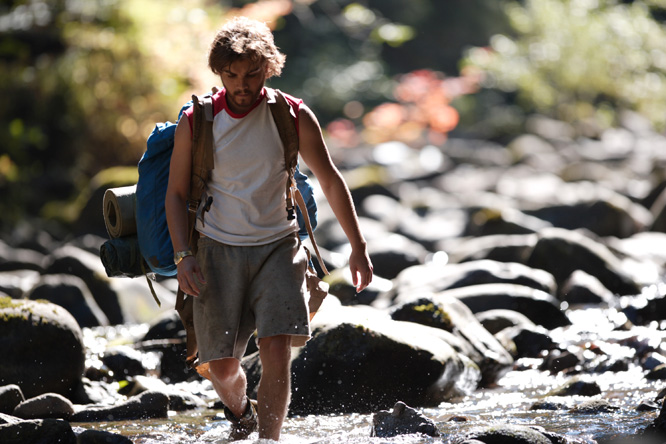A quick recommendation here to catch Sean Penn’s magnificent Into the Wild while it’s still in the theaters unless you already have one of those new humongous screens at home. Some of the visuals – not just of the Alaskan wilderness, but of the Anza Borrego desert in
A film made from a popular book based on real events, in this case Jon Krakauer’s account of the transformation of Emory University graduate Christopher McCandless into Alexander Supertramp, sort of the ultimate post-hippy Thoreau wannabe who hitches all around the west before heading to Alaska, his great dream, to get away from it all, and who does – so well in fact that when he decides to head south again, he finds himself trapped, the game he’s lived off of for months having itself fled, then poisons himself by misidentifying the wrong potato root, and as a result starves to death at the age of 24 – Into the Wild’s challenge is to make Supertramp’s solitary ways interesting as narrative. Penn does this by making it two stories: the first that of his surprisingly brief time, less than four full months, in the Alaskan wilderness, camping out for the most part in an abandoned bus; the second the tale of the journey that took McCandless from graduation in Atlanta to the road north on his final venture. It is the second tale, which is that of human relationships, that holds up this film. We witness McCandless’ gradual transformation into Supertramp, told in terms that don’t make him seem at all the extremophile it would be easy enough to dismiss him as, while at the same time setting up a final transformation at the end of the other tale in
His parents, played by William Hurt & Marcia Gay Harden, undergo a transformation of their own in losing their son, who simply disappears after graduation, sending all of his savings to Oxfam, abandoning his car in
If Keener proves to be a surrogate mother to Alexander Supertramp, Hal Holbrook’s portrayal of Ron Franz, a retired military man making a modest living as a leather worker in the
This is a world off the grid – sort of upper limit Burning Man, lower limit the gypsy audiences of the Grateful Dead. It’s radically different from, say, the life of the urban homeless, as Alexander learns when he tries to spend a night at a mission in
Penn does a great job handling this material without judgment. Unlike, say, Motorcycle Diaries, where you can see the rigidities in its lead character, a college-age Che Guevara, that will lead him to become Castro’s Trotsky, I don’t think you can come out of Into the Wild with any sense of diagnosis beyond the notion that kids in violently dysfunctional families are apt to react strongly to the emotional abuse. Penn is much more interested in the books Supertramp reads: Jack London, Tolstoy, Dr. Zhivago. An even more delicate proposition is giving a sense of Alexander’s inexperience as an outdoorsman – the driver of his last ride in gives him his boots and tells the kid to call him “if you survive” – without making him look like a fool who could have found emergency supplies and a way out within a quarter mile of the bus where he died. Penn shows Alexander hunting for edible plants with his guide book in hand. He manages to kill a moose, but since all he knows about what to do with game that size comes from notes he took back on the wheat farm, he has to go back & read them, which takes too long so that flies lay eggs in the carcass.
McCandless/Supertramp has become something of a folk hero since his death, the abandoned bus turning into the closest thing






